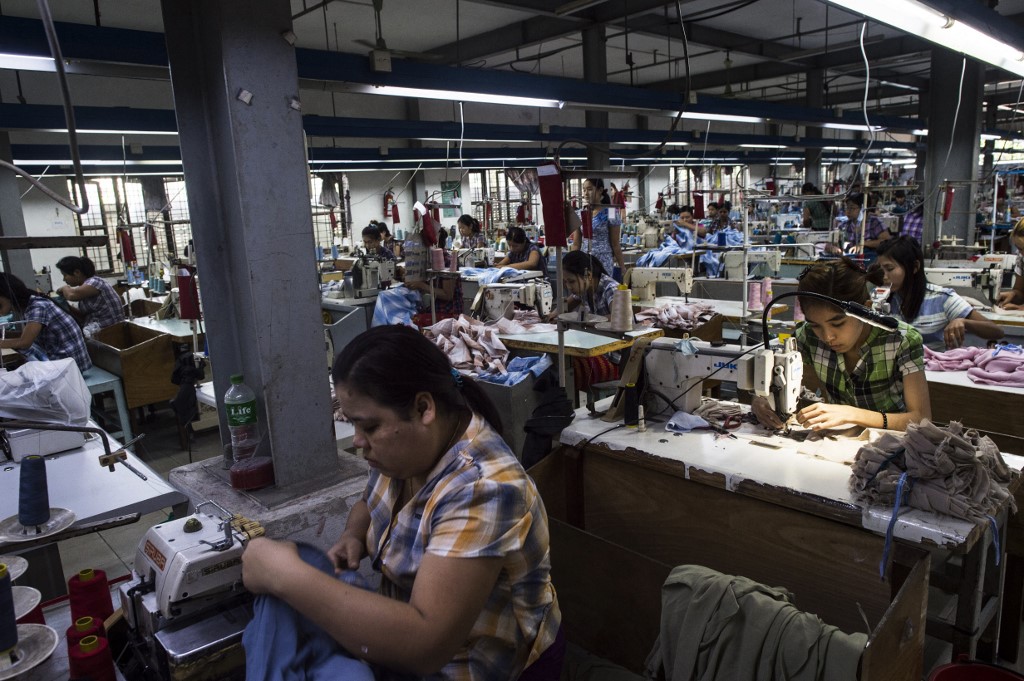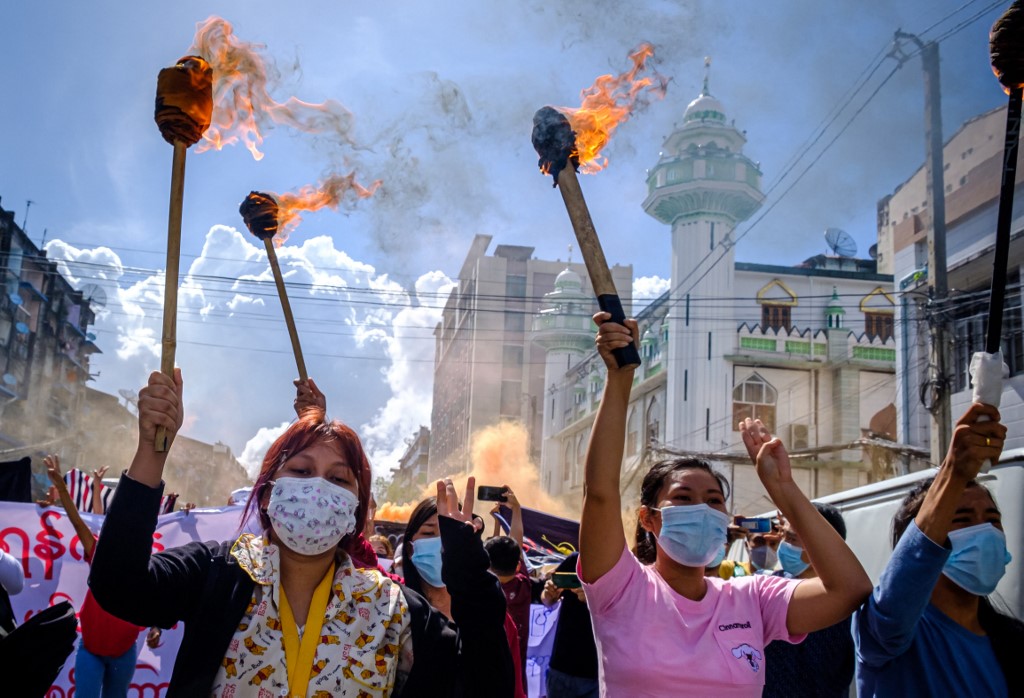Once a week, a female garment worker in Myanmar makes an anxious journey to appear before local officials to register her employment and residency in her current township.
Before the country’s February 1 coup, back when the national economy looked like a rising star in Southeast Asia, this bureaucratic ritual happened on a monthly basis. Now, she’s not only required to make the trek far more often, but also under more perilous conditions due to the military checkpoints along the way where soldiers check her bag, phone, identification and household registration.
She now makes the trip with cash in hand to pay the registration officers and ensure her precarious residency for the next seven days. It’s a complication she says didn’t exist before the coup, making her meagre earnings that much more precious.
“The officer only acknowledges our stay only if we pay the money,” said the garment worker, who wished to remain anonymous and is one of hundreds of thousands in the industry navigating employment in post-coup Myanmar. “[There’s] no safety and we have to pass through the nights that are worrisome and fearful. We can’t eat and sleep peacefully.”
According to Moe Sandar Myint, chairwoman of the labour union Federation for General Workers Myanmar (FGWM), this is the grinding reality many garment workers face after the military coup. The putsch has forced them to navigate precarious working conditions as some industrial zones remain under martial law.
“Under martial law, workers feel there’s no security and no safety and they feel and think that they have to go to work within the margin of their life,” she told the Globe. “They bet their life as a cost to go to work, because under martial law, there are a lot of possibilities which can affect the livelihood of the workers.”
Myanmar’s garment industry had already struggled through the pandemic-related global economic downturn when the coup upended whatever normalcy remained. In response to the military takeover, fashion brands paused orders amidst calls for boycotts and sanctions, dealing a further blow to garment producers in-country. But the decision from brands in May to resume orders in Myanmar has left many workers with more complications than solutions.
Squeezed between a need for income, a political movement calling for mass work strikes and boycotts, and an unpredictable military that began targeting union leaders in the early days of the coup, the workforce is finding itself in a desperate situation. Moe Sandar Myint says some employers in the garment sector are taking advantage of that.
One of the biggest changes her organisation has seen is a move from permanent positions, which come with attendance bonuses, overtime pay and other benefits, to a more tenuous daily wage. Daily wage workers receive no contract or guarantee of employment from one day to the next.
While most permanent workers in normal conditions make 4,800 kyat, or $2.92, as a minimum wage, Moe Sandar Myint says the wage has now been reduced to 3,600 kyat, or just $2.19 per day in some cases. This move also eliminates the possibility of overtime pay, attendance bonuses, or even a guaranteed one day off per week under Myanmar’s labour law, also leaving workers vulnerable to the whims of their employer.
“Right now, the real problem in the garment sector is the employer wants to hire the workers with daily wages because the cost is really low,” she said. “If the employer doesn’t like this specific worker, they easily dismiss them without proper reason and without proper compensation.”
What’s worse, she added, some factory managers and owners cooperate with the military State Authority Council junta in reporting and spying on workers.
“Some employers are trying to work together with the [State Authority Council], the military, and use the military as a tool to oppress the workers and oppress the union movement in the factory,” she said.

Myanmar’s garment sector had already sagged under the Covid-19 slowdown and the military coup only drove unemployment to new highs. By May, the European Chamber of Commerce in Myanmar estimated that a quarter of the country’s garment workers had lost their jobs. By June, despite new orders being placed again, 31% of those in the apparel sector were unemployed, with total work hours reduced by more than half.
As factories close both temporarily and permanently, the unnamed garment worker says they sometimes don’t provide compensation to the workers left behind, who are growing more incapable of meeting their basic costs of living, such as for rent and food.
“Some factories genuinely cannot provide overtime, but some are not like that. They hire daily wage workers to do overtime and pay 3,600 [kyat]. No overtime means less wage we get,” the worker said. “There are also more unemployed workers. Living expenses become higher. Workers and the public are gradually descending into hunger.”
H&M was one fashion brand that resumed orders in May. The company’s spokesperson Ulrika Isaksson says that while it hasn’t made any long-term decisions about staying in Myanmar, their new orders have provided 50,000 people with jobs. While some of their factories and suppliers are in places under martial law, Isaksson said there is a mediation process in place for workers’ rights disputes.
Along with 19 other brands, H&M has signed an industry agreement – known as Action, Collaboration, Transformation (ACT) – that commits to ensuring the local factories producing their goods uphold workers’ rights to a living wage, collective bargaining, safety and other guidelines for termination and compensation.
“We are aware of increased challenges in relation to fundamental human rights, such as freedom of association, and we have raised this concern with suppliers as well as trade unions, brands and human rights organisations,” Isaksson said in a statement to the Globe.
“In this difficult and complex situation, we cannot stress enough the importance that all stakeholders work closely together to tackle any issues. Partnership and transparency will be key.”
Inside the factory, there are no effective arrangements to shield Covid-19. Lots of workers have already died due to Covid-19
But within Myanmar’s new political context, the unions’ already precarious bargaining power has only worsened. Most were declared illegal in the early days of the coup, and their participation in the ensuing protests and Civil Disobedience Movement (CDM) have put them at odds with some factory owners who have aligned with the military.
Moe Sandar Myint says unions now have a diminished ability to negotiate with factory owners, capitalising on their weakened status. Myanmar’s severe Covid-19 outbreak in recent months has only created an additional point of tension between workers and management.
“Inside the factory, there are no effective arrangements to shield Covid-19. Lots of workers have already died due to Covid-19,” she said. “Factory management tries not to highlight this kind of issue. Even if workers pass away due to Covid, they try to abolish the reason of being dead, [they say] it’s due to other reasons.”
Moe Sandar Myint said transportation and safe housing have also been growing concerns among workers in recent months. For those living and working in areas under martial law, checkpoints for workers, especially those traveling on their own via motorbike to and from work, presents new risks.
“Sometimes soldiers call the garment workers, mostly the women and ladies, they try to ask and check for some documents, but sometimes they try to sexually abuse [them]. This is a really hard situation for the workers and a very dangerous situation for every woman.”
In spite of this, researcher Sara Tödt, who studies the social effects and economic plight of Myanmar’s garment workers with the Royal Melbourne Institute of Technology, said women are holding tightly to these jobs.
“The tricky part is that these jobs are really, really important to these workers,” she said.
“These garment jobs that these women have aren’t just something on the side, but something that’s motivating them to keep going and building to a future that they are hoping is going to be better.”
In her interviews with 24 garment workers in January and June of 2021, she found that months-long stretches of unemployment were building desperation among workers who feel pressure to provide for families, especially with the basics such as food.
With orders placed once again, day wages became a way for workers’ to improve their situation. But Tödt says these workers may also be left in the vulnerable position of taking any income they can get, regardless of conditions or danger.
“What needs to be at the centre of the analysis of whether to place orders is acknowledging that workers need these jobs, they want these jobs to come back, they want to come back to work,” Tödt said.
“But also not leveraging the desperation to the level where they can’t make informed decisions about their own safety.”

Now, with fashion brands making tentative returns to the country, a broad cross section of unions, brands, activists and academics are debating the ethics of going back to work.
With Myanmar’s economy already predicted to shrink by 18% this year, there’s concern about how cutting off a major employer in the garment sector would impact the country overall. Moreover, given that the military footprint within the sector is minimal compared to other industries, some believe the harm directly done to the junta by cancelling orders would be limited.
But as workers remain vulnerable, Curtin University Professor Htwe Htwe Thein, a Perth-based academic who specialises in international business, emphasises that if international brands are to resume orders, they need to leverage strategies such as the ACT industry agreement to ensure factories are upholding workplace standards.
“[Authorities] are cracking down on labour, so the worry is that they [factory owners] might start to get relaxed about worker’s rights and pay and working conditions,” she said.
But even with external stakeholders attempting to ensure safe conditions, whether to resume work at all during the CDM remains a point of contention among unions. As the coup drags into its seventh month, the initial vigour for labour strikes is being met with increasingly mixed reactions among those in need of a day’s wage.
“Even that is a disagreement between [union] advisors,” Htwe Htwe Thein said about the discussion among labour groups whether to resume working. “Some decisions are happening, it’s not all hunky-dory ‘come back, come back.’”
Labour researcher and Clean Clothes Campaign liaison Hay Mhan says the question of whether to return to work has been a point of discussion among workers and labour organisers, as the need for an income has become increasingly urgent. While food security was a large problem in the 50 interviews Hay Mhan did immediately before the coup, the need has only escalated as unemployment has grown.
“Even in the labour movement itself, there is some division,” Hay Mhan said. “It’s hard to say, it depends on who you talk to.”
But others, such as Moe Sandar Myint, point to poor working conditions and persecution to stake out a firm position, urging fashion brands not to place orders again to maintain a total boycott of Myanmar’s economy.
“What do we receive from re-orders from the brands? We still lost our rights inside the factory,” Moe Sandar Myint said.
“That’s the reason why a lot of workers and factory union leaders will face our hardships in the short-term, but in the long-term we have to abolish the [military] leadership. So that’s the only way [to remove the military], to stop the re-orders from Myanmar.”


